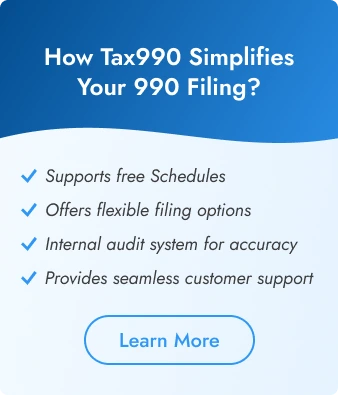What Should Title Holding Corporations for Exempt Organizations Know About Tax Exemption and Form 990 Filing?
- Updated August 14, 2023 - 2.00 PM - Admin, Tax990
For the purposes of granting federal tax exemption to nonprofit organizations, various IRC sections have been established by the IRS. Depending on the organization’s type, operational purpose, and a few other factors, the IRS classifies a nonprofit under the corresponding section.
This article details how the IRS defines Title Holding Corporations for Exempt Organizations, how they can obtain federal tax exemption, and what their tax filling requirements are.
Table of Contents
How Does the IRS Define Title Holding Corporations for Exempt Organizations?
Per IRC Section 501(c)(2), Title Holding Corporations for Exempt Organizations are established exclusively for the purpose of carrying out the following activities:
Holding title to the property
Collecting income from that property
Turning over the entire amount (minus expenses) to one parent (exempt) organization.
How Can the Title Holding Corporations Apply for Tax Exemption?
Title Holding Corporations for Exempt Organizations seeking tax-exempt status under Section 501(c)(2) are required to file Form 1024- Application for Recognition of Exemption Under Section 501(a) or Section 521 of the Internal Revenue Code (IRC).
Additionally, there are a few other requirements that corporations must comply with in order to be
eligible for exemption:
The organization must operate as a corporation.
There should be effective ownership/control over the corporation by the distributee-exempt organization.
- For example, controlling the title-holding corporation by owning its voting stock or
possessing the power to.
What are the 990 filing Requirements for Title Holding Corporations?
Organizations that obtain tax-exempt status under Section 501(c)(2) must still report their financial information, activities, and more to the IRS by filing a 990 Series Form every year. Depending on the organization’s gross receipts/assets, they will file the corresponding 990 Form:
If the Title Holding Corporations which have gross receipts of $50,000 or less should
file Form 990-N.
If the Title Holding Corporations which have gross receipts of less than $200,000 and assets less than $500,000 should file Form 990-EZ.
If the Title Holding Corporations which have gross receipts of $200,000 or more (or) assets of $500,000 or more should file Form 990.
Additional Filing Requirements
Based on the details reported on their 990 or 990-EZ return, Title Holding Corporations may be required to include certain 990 Schedules.
Generally, Title Holding Corporations aren’t allowed to have any unrelated business income. However, under certain exceptions, they can be involved in unrelated business or trade. In those cases, if the organization’s UBI is $1000 or more, they should file Form 990-T.
When is the Form 990 Due Date for the Title Holding Corporations?
Generally, the due date to file 990 returns is the 15th day of the 5th month following the end of the accounting period followed by the organization.
Organizations operating on a calendar tax year have a deadline of May 15th.
Operating on a fiscal tax year? Find your 990 deadline here.
If the deadline falls on a weekend or any federal holiday, the deadline will be pushed back to the next
business day.
Form 990 Filing Made Easy and Secure for Title Holding Corporations!
Tax 990, the IRS-authorized e-file provider, offers an easy and secure way for Title Holding Corporations and other tax-exempt organizations to e-file their 990 returns.
Here are just a few of the numerous helpful features offered by Tax990 to simplify filing:
Includes Schedules - Tax990 automatically includes the Schedules required for free based on the
data entered.
Multiple Filing Options - The 990 forms can be prepared seamlessly using Form-based or Interview-style filing options.
Internal Audit Check - In order to ensure accurate returns, Tax990 audits the completed forms
for IRS errors.
Retransmit Rejected Returns - The 990 returns rejected by the IRS can be retransmitted for free after fixing the errors.
Live Customer Support - Our team of experts is always available to resolve any questions instantly via live chat, phone, and email.


